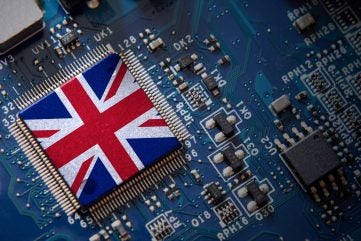
The UK’s Department for Science, Innovation and Technology (DSIT) has unveiled a £22m investment in two semiconductor research hubs.
The funds will support projects focusing on silicon photonics and compound semiconductors, integral components for advancements in AI and the technologies crucial for achieving net zero.
Coinciding with the one-year anniversary of the DSIT, the University of Southampton’s “Cornerstone” and Bristol’s REWIRE facilities will each receive £11m.
These Innovation and Knowledge Centres (IKC) will play a pivotal role in converting scientific breakthroughs into market-ready technologies, fostering growth, and creating high-skilled jobs in the UK.
Semiconductors, used in devices from mobile phones to medical equipment, underpin pivotal technologies for net zero, AI, and quantum computing.
They have attained global strategic significance in recent years, with the US moving to impose export restrictions to limit China’s access to the technology in 2022.
GlobalData reported in a briefing that the global semiconductor industry is now worth over $600bn, having achieved a CAGR of 8.3% between 2017 and 2022.
The Asia Pacific region accounts for the majority of this market, earning a combined revenue of $370bn in 2022 whilst the Americas only earned around $141bn that same year.
The UK government’s £1bn National Semiconductor Strategy outlines a 20-year plan to leverage the country’s strengths in design, research and development, and compound semiconductors.
The £1bn figure faced backlash from critics as it is dwarfed by US and EU government support plans of closer to $50bn (£40bn).
Research director at GlobalData Josep Bori said: “As the UK does not have the scale to compete with the likes of the US, China, South Korea, Japan and the European Union in R&D investments, and more so since Brexit, these types of targeted investments seem more sensible.”
“In its national semiconductor strategy announced last year, the UK government identified the target areas as intellectual property and design, compound semiconductors and research and development,” added Bori.
“Clearly not advanced semiconductor manufacturing which requires multi-billion dollar investments in fabs and complex supply chains, including access to critical minerals,” he said.
The IKC in Southampton will focus on silicon photonics, an emerging semiconductor research area utilising light instead of electricity for communication.
Bristol’s facility, co-created with industry collaboration, will accelerate the UK’s net zero ambition by advancing high-voltage electronic devices with cutting-edge compound semiconductors.
In addition to the IKC funding, £4.8m has been allocated to 11 semiconductor skills projects nationwide. This initiative aims to promote talent across educational tiers, addressing workforce talent and training gaps within the UK’s semiconductor industry.



